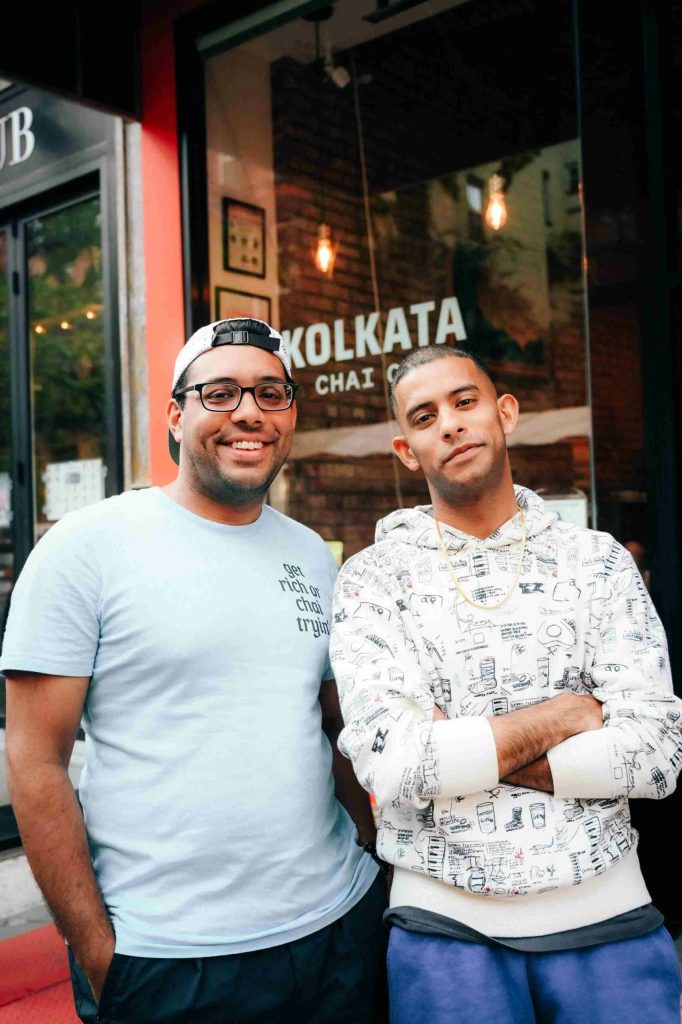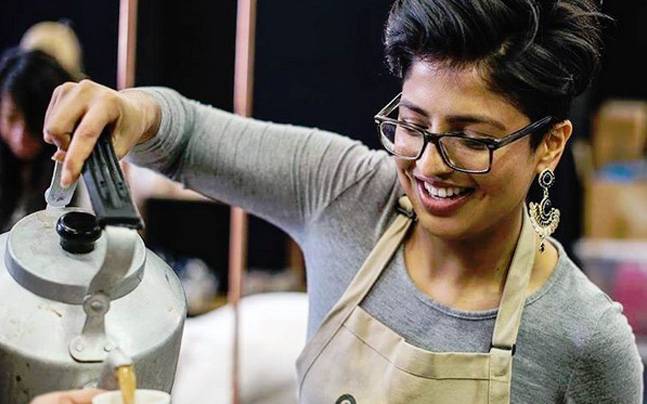(February 2, 2024) Indians love their chai – no matter whether they are in India or abroad. Two Indian-American brothers with their roots in Kolkata often took to the streets of New York in search of that kadak cup of chai. But all they got was a westernised version that lacked the authenticity of a good Indian tea. This led to the birth of Kolkata Chai Co. in 2019 – which has Ayan and Ani Sayal on a mission to bring authentic tea to New Yorkers. “Kolkata Chai started with a simple idea: How do we extend the authenticity, respect, and tradition behind a cup of masala chai to NYC?” the brothers write on their website.
Massachusetts Masala
It was in 1987 that their parents landed in Massachusetts to fulfill the American dream, and growing up as first-generation Indian Americans, their concept of home was ever-shifting. “In 90’s America, we listened to hip hop, ate pizza, and begged our parents for a pair of Vans sneakers. Every other summer or winter, we’d spend a couple of months in Kolkata. An earth-shattering contrast, there, we would jump in monsoon puddles, eat mangsho-jhol, play cricket in the streets, and drink chai every day,” they added.

Ayan and Ani Sanyal
The brothers often joked that the street vendors of Kolkata possessed some magical skills. “From eating bhel puri in newspaper cones to visiting the same chai stalls that our mother would frequent during her college years, we developed a deep respect for the tradition and personal nature of food,” Ayan said in an interview. They would enjoy kulhad chai on the streets of Kolkata, something they missed dearly on their return to the US. “The satisfaction we got from smashing the clay bhar cups into the ground after finishing our chai was unparalleled,” said Ani, adding, “There was a lore to street food. It was democratising, generational, and spoke to all socio-economic levels.”
Recreating Kolkata street food charm in NYC
Upon their return from one such trip to Kolkata, they were brimming with excitement to bring the authentic desi cup of chai to the people of New York, and that led to Kolkata Chai Co. They wanted to make South Asian culture and cuisine accessible to everyone through chai and street food. “For the first 18 months after we had the idea, we would do pop-up shops and farmers markets in NYC, and got a great response. Following this success and getting a sense that people loved desi chai, we opened the NYC cafe to a line of 700 people in 2019,” added Ani. Apart from chai, their menu includes Indian street food – which encompasses Kolkata-style egg rolls, samosas, chaats, and more. “We also feature seasonal menus for the fall and summer, where you can catch our ‘Ma’s Ginger Chai’, a take on the simple, yet highly effective ginger tea our mother made for us growing up. We also serve mint lemonade, which is a spin on a childhood classic we grew up with in Kolkata,” said Ani.
View this post on Instagram
Betting on themselves and their food culture
However, starting their own venture wasn’t a cakewalk for the Sanyal brothers due to lack of capital and resources. Moreover, they had no clue that running a food business in an expensive and competitive place like New York being would be difficult. “Barely six months into our cafe operation, the pandemic shut all the restaurants in the city down and we were forced to close,” added Ani. But that didn’t stop the Sanyal brothers who knew that had to bring in a new strategy to keep their business afloat. They started delivering chai in their car across NYC and shipping the chai mix across the country. “These lessons taught us to be sharp operators and we’ve been able to sustainably grow ever since,” revealed Ayan.
Keen to put Kolkata in NYC, they did everything to bring authentic flavours to the city. For them, a perfect cup of chai is a balance of cardamom, ginger, milk, and really strong black tea. “If you get all these things kind of perfectly done, then it makes a really wonderful, warming, and energizing drink,” said Ayan, who takes care of the retail while his brother Ayan runs the marketing and branding of the brand. They are happy that New Yorkers are open to education their own palettes, and have embraced Kolkata Chai with open arms.
Seeing their parents struggle to make their American dream come true, the Sanyal brothers are telling a story of their culture through their chai. “We don’t get to really tell our story a lot of the time. And I think that’s what, you know, we’ve done with Kolkata Chai — is really plant a flag for where our family comes from, what our culture is about.”
- Follow Kolkata Chai Co on Instagram




